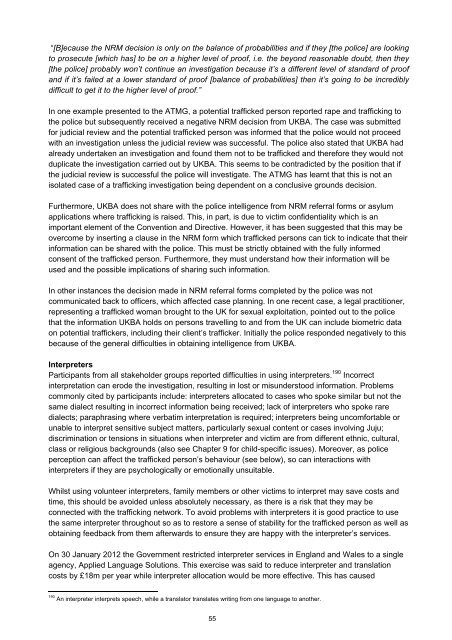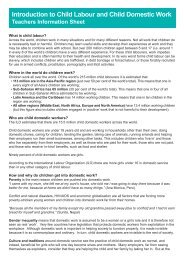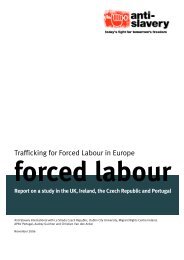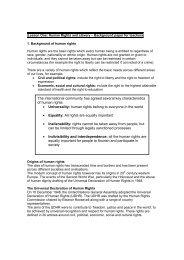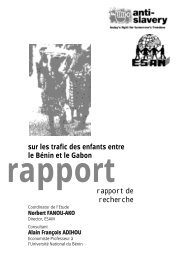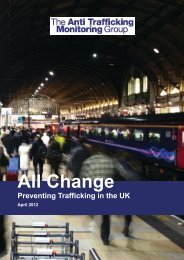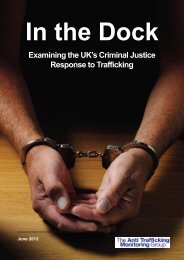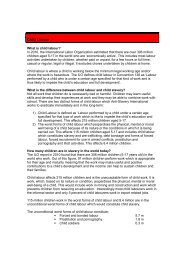In the Dock
Full report (1810.59KB) - Anti-Slavery International
Full report (1810.59KB) - Anti-Slavery International
You also want an ePaper? Increase the reach of your titles
YUMPU automatically turns print PDFs into web optimized ePapers that Google loves.
“[B]ecause <strong>the</strong> NRM decision is only on <strong>the</strong> balance of probabilities and if <strong>the</strong>y [<strong>the</strong> police] are lookingto prosecute [which has] to be on a higher level of proof, i.e. <strong>the</strong> beyond reasonable doubt, <strong>the</strong>n <strong>the</strong>y[<strong>the</strong> police] probably won’t continue an investigation because it’s a different level of standard of proofand if it’s failed at a lower standard of proof [balance of probabilities] <strong>the</strong>n it’s going to be incrediblydifficult to get it to <strong>the</strong> higher level of proof.”<strong>In</strong> one example presented to <strong>the</strong> ATMG, a potential trafficked person reported rape and trafficking to<strong>the</strong> police but subsequently received a negative NRM decision from UKBA. The case was submittedfor judicial review and <strong>the</strong> potential trafficked person was informed that <strong>the</strong> police would not proceedwith an investigation unless <strong>the</strong> judicial review was successful. The police also stated that UKBA hadalready undertaken an investigation and found <strong>the</strong>m not to be trafficked and <strong>the</strong>refore <strong>the</strong>y would notduplicate <strong>the</strong> investigation carried out by UKBA. This seems to be contradicted by <strong>the</strong> position that if<strong>the</strong> judicial review is successful <strong>the</strong> police will investigate. The ATMG has learnt that this is not anisolated case of a trafficking investigation being dependent on a conclusive grounds decision.Fur<strong>the</strong>rmore, UKBA does not share with <strong>the</strong> police intelligence from NRM referral forms or asylumapplications where trafficking is raised. This, in part, is due to victim confidentiality which is animportant element of <strong>the</strong> Convention and Directive. However, it has been suggested that this may beovercome by inserting a clause in <strong>the</strong> NRM form which trafficked persons can tick to indicate that <strong>the</strong>irinformation can be shared with <strong>the</strong> police. This must be strictly obtained with <strong>the</strong> fully informedconsent of <strong>the</strong> trafficked person. Fur<strong>the</strong>rmore, <strong>the</strong>y must understand how <strong>the</strong>ir information will beused and <strong>the</strong> possible implications of sharing such information.<strong>In</strong> o<strong>the</strong>r instances <strong>the</strong> decision made in NRM referral forms completed by <strong>the</strong> police was notcommunicated back to officers, which affected case planning. <strong>In</strong> one recent case, a legal practitioner,representing a trafficked woman brought to <strong>the</strong> UK for sexual exploitation, pointed out to <strong>the</strong> policethat <strong>the</strong> information UKBA holds on persons travelling to and from <strong>the</strong> UK can include biometric dataon potential traffickers, including <strong>the</strong>ir client’s trafficker. <strong>In</strong>itially <strong>the</strong> police responded negatively to thisbecause of <strong>the</strong> general difficulties in obtaining intelligence from UKBA.<strong>In</strong>terpretersParticipants from all stakeholder groups reported difficulties in using interpreters. 190 <strong>In</strong>correctinterpretation can erode <strong>the</strong> investigation, resulting in lost or misunderstood information. Problemscommonly cited by participants include: interpreters allocated to cases who spoke similar but not <strong>the</strong>same dialect resulting in incorrect information being received; lack of interpreters who spoke raredialects; paraphrasing where verbatim interpretation is required; interpreters being uncomfortable orunable to interpret sensitive subject matters, particularly sexual content or cases involving Juju;discrimination or tensions in situations when interpreter and victim are from different ethnic, cultural,class or religious backgrounds (also see Chapter 9 for child-specific issues). Moreover, as policeperception can affect <strong>the</strong> trafficked person’s behaviour (see below), so can interactions withinterpreters if <strong>the</strong>y are psychologically or emotionally unsuitable.Whilst using volunteer interpreters, family members or o<strong>the</strong>r victims to interpret may save costs andtime, this should be avoided unless absolutely necessary, as <strong>the</strong>re is a risk that <strong>the</strong>y may beconnected with <strong>the</strong> trafficking network. To avoid problems with interpreters it is good practice to use<strong>the</strong> same interpreter throughout so as to restore a sense of stability for <strong>the</strong> trafficked person as well asobtaining feedback from <strong>the</strong>m afterwards to ensure <strong>the</strong>y are happy with <strong>the</strong> interpreter’s services.On 30 January 2012 <strong>the</strong> Government restricted interpreter services in England and Wales to a singleagency, Applied Language Solutions. This exercise was said to reduce interpreter and translationcosts by £18m per year while interpreter allocation would be more effective. This has caused190An interpreter interprets speech, while a translator translates writing from one language to ano<strong>the</strong>r.55


